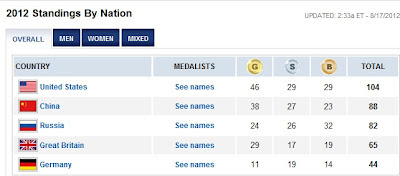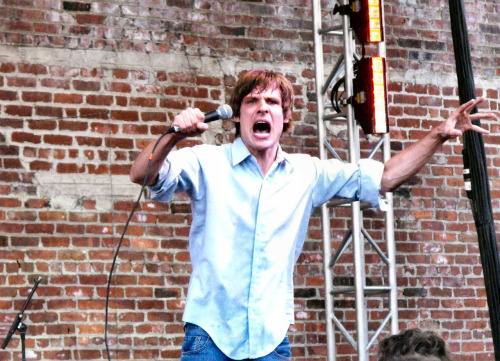Watching The Hunger Games again, it was hard not to think
back to the recently completed Olympics and understand clearly how the
spectacle was really just a narrative conceived about American
exceptionalism. Hidden completely from
the scorecarding is the concept of privilege.
Like The Hunger Games, the Olympics are supposed to
be bound by a universal fairness; the rules are supposedly the same for every
participant. And while that’s probably
true, it ignores the whole spectrum of human experience that takes place before
the contenders even set foot on Olympic turf, not to mention home court advantage,
something regularly doled out almost exclusively to the top tier of the first
world. Like the Hunger Games where contenders from the wealthier/leisure class districts are always poised to win, the first world tends to come out on top every Olympic season.
The British population was understandably disturbed by
the degree to which London became a police state during the games, the ways in
which free speech and democracy were suspended in Olympic Park. But the type of TV show, the entire genre of
the program, would be radically altered if the security state took place in
some war-torn part of the world (Afghanistan, for instance, competes in the
games). The meaning of the security
state is not to protect London’s guests from the internal threat of its own
megalomaniacs, but to protect London itself from outsiders.
The Olympics may be about unity for some, but
conveniently enough it also fulfills the needs of nationalism for the Winners
as well, as illustrated in the graph below taken from NBC’s final polling
The U.S., thought by most in the world to be in decline,
symbolically re-asserts its dominance in the final tally, with China trailing
shortly behind. Meanwhile, Britain, a
relatively small country compared to the other top 4 nations, is considered a
loser in this game, but not because of its breakdown of winners and
losers. Britain’s failure is said to be
due to falling behind the high standard of spectacle set by China (despite a
painfully forced attempt at a definitive assertion of British influence in its cluttered
and clumsy closing ceremony).
In The Hunger Games, the games exist as
a metaphorical declaration of power and control, but their audience is no one
in particular. This makes them a popular
pastime in the leisure class communities and a grim reinforcement of despair in
the poorer districts. Still, while the
Capitol seems content with pleasing only those with the luxury to enjoy
bloodsports, a secondary goal seems to be to market the games as a source of
enthusiasm for the disenfranchised.
The individual stakes are obviously much lower for the
Olympics, but why would any of the smaller nations even bother to compete when
the outcome is consistently a reassertion of the existing hierarchy of nations
if not for the almost universally accepted notion that the games themselves exist
as some kind of harmonious global accord? What most of these countries have in
common though is certainly not a level playing field in which one can
reasonably ordain athletic excellence.
The thing that truly unites nations under the Olympic banner is the
sponsors. Why exactly would a state competition
need private sponsors if not to grant said economic benefactors exclusive two
week VIP access to the world’s attention span?
If state and capital, business and society, are interchangeable
components of one another, there’s no exception to that at the Olympics, where
brands often get as big headlines as the athletes. Winners for the Official Soft Drink and
Official restaurant of the Olympic are touted as if they too had won a
competition, as if they too had been bidding for the position on the equal
opportunity platform called capitalism.
The Olympics are the soft sell state of the union,
showing nature in perfect balance, the status quo in no danger of being knocked
loose. A world coming together under one
giant security apparatus.
*******************
I was also struck by the following quote in The
Hunger Games by Donald Sutherland’s President Snow, as he discusses
why the games exist and why the Capitol doesn’t just summarily execute captives
from each district”:
“Why do we have a winner?
Hope. It is the only thing stronger than fear. A little hope is effective, a lot of hope is
dangerous. A spark is fine, as long as it is contained.”
I’m sure it’s been commented on before, but this closely parallels
Bane’s dreadfully expository comments to Batman in the Dark Knight Rises, which
also forms a crucial thesis fueling that film:
“There's a reason why this prison is the worst hell on
earth... Hope. Every man who has ventured here over the centuries has looked up
to the light and imagined climbing to freedom. So easy... So simple... And like
shipwrecked men turning to sea water from uncontrollable thirst, many have died
trying. I learned here that there can be no true despair without hope.”
In an election year moving deeper into the post-crash
era, the recurrence of a central theme of misbegotten hope in the year’s two
biggest blockbusters would appear at a glance to be a referendum on Obama, but
The Dark Knight Rises, as
illustrated elsewhere, reserves most of its potshots for the Occupy
movement. In depoliticizing class
struggle, The Dark Knight Rises ultimately lands at the Obama conclusion, that
the masses cannot be trusted with their own revolution and our real hope lies
in the charity of a well-intentioned elite of millionaire benefactors who we
have to hope will be kind enough to throw us a bone every now and then.
The Hunger Games on the other hand, while
not exactly an occupy text, does do a decent job at laying out the framework of
income inequality and how privilege predisposes some to unfair advantages. Notably, the film adds a scene not in the
book in which the death of a character causes the citizens from the character’s
district to riot. The all-too-familiar
scene of police in riot gear marching in lock-step and fire hoses blazing seems
at a moment to be removed from the high concept sci-fi environment and placate
itself squarely in the realm of recent history.
In the end though, since there can only be a “contained” spark, Katniss’s
battleground is firmed squarely in the symbolic terrain, challenging and thus
causing ruptures in the official narrative.
As the baton for the Olympic spectacle gets passed to the
election spectacle, one always hopes for these types of tiny ruptures, ones that refuse to
play into the universal narrative of a continued order whose control subjects
couldn’t be happier to root for its sustained dominance. Even if this doesn’t play out in Washington,
it seems to have done so in Hollywood, where two of the biggest spectacles of
the year have felt compelled to acknowledge the demands and grievances of Occupy,
rupturing their way into our most popular narratives, for good or ill.



